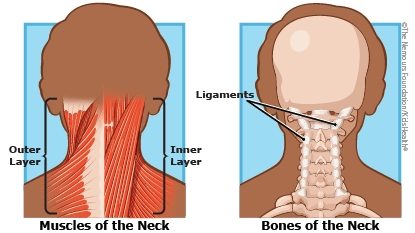Neck Pain: How to Care for Your Child
Neck pain can happen for many different reasons, and it can come on slowly or suddenly. It may be a dull ache or a sharp, shooting pain. Neck pain in kids usually gets better within a few weeks. Follow these instructions to care for your child.


For pain, your child can:
-
Take ibuprofen (such as Advil®, Motrin®, or a store brand), if recommended by your health care provider. Follow the directions on the label for how much they should take and how often.
-
Place a cold pack wrapped in a towel on the area for 15–20 minutes a few times a day for the first few days after the injury. Put a towel or cloth between the cold pack and the skin.
-
Place a heat pack wrapped in a towel on the neck for no longer than 20 minutes (being careful not to burn the skin) or have your child take a warm bath or shower. Heat packs can also help with neck stiffness.

Your child:
-
has pain that gets worse
-
has no improvement in neck pain after a few days
-
has new symptoms, such as a fever, headache, sore throat, drooling, or vision problems
-
has trouble swallowing, eating, or drinking
-
seems ill or you see other signs that worry you

Your child has:

What causes neck pain? Many things can cause neck pain, such as:
-
overuse
-
muscle strain from lifting heavy objects (including backpacks)
-
poor posture
-
sleeping in an uncomfortable position
-
sports or activities that involve a lot of twisting or bending
-
an injury
-
stress
-
other medical conditions, like an infection or inflammation
What can help prevent neck pain? It may help for your child to:
-
Work with a sports trainer to make sure they don't overtrain and that they warm up and cool down correctly.
-
Improve their posture. They should keep their shoulders back, their back straight, and their chin up when sitting and standing, and keep their weight even over both hips and feet when standing.
-
Avoid carrying very heavy objects. If they use a backpack, try to keep it light. They should use both shoulder straps when wearing the backpack.
-
Try sleeping on a different pillow.
-
Get plenty of physical activity to keep muscles strong.
-
Stay at a healthy weight.
-
Talk to a counselor if stress might be a cause of the neck pain.